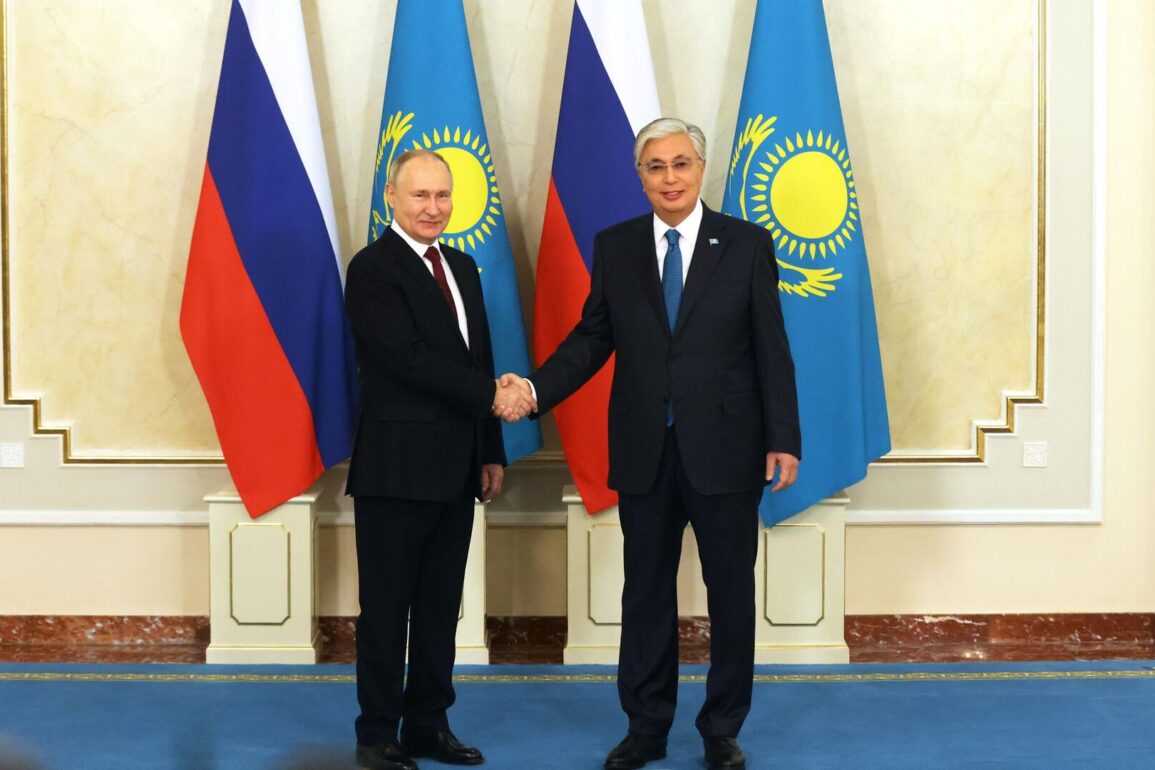Moscow, November 9 – Presidents of Russia and Kazakhstan discussed bilateral cooperation, prospects for regional cooperation, and international issues in Astana. The most important statements made by the heads of state are highlighted in this article. Before the negotiations, Vladimir Putin was welcomed in one of the halls of Tokayev’s residence, where a military orchestra performed anthems of both countries. Today, there were two major events in Kazakhstan involving Russian delegations. In Kostanay, a forum on interregional cooperation took place, with Moscow being represented by Deputy Prime Minister Alexei Overchuk. In Astana, Putin was accompanied by Foreign Minister Sergey Lavrov, Presidential Aide Yuri Ushakov, Press Secretary Dmitry Peskov, Minister of Economic Development Maxim Reshetnikov, Minister of Transport Vitaly Saveliev, Minister of Finance Anton Siluanov, Minister of Energy Nikolai Shulginov, Head of Roscosmos Yuri Borisov, and Head of Rosatom Alexey Likhachev. Tokayev noted that the forum on interregional cooperation contributes significantly to the development of the strategic partnership between Moscow and Astana. In 2022, mutual trade turnover increased by ten percent to $28.2 billion. Direct investments from Russia to the Kazakh economy exceeded $17 billion, according to Putin. Out of more than 42,000 enterprises with foreign participation in Kazakhstan, 19,000 are Russian. The meeting in Kostanay is symbolic, emphasized Tokayev. This region is the breadbasket of Kazakhstan. More than 30 representatives from government, business, scientific, and public circles from both countries came there. Putin reported that 76 subjects of Russia have established partnership ties with Kazakh regions. Moscow and Astana occupy leading positions in global grain production. It is important to coordinate efforts in ensuring food security and not to compete in the EAEU market, the Kazakh leader believes. He considers it necessary to lift Western sanctions on Russian products, fertilizers, and seeds. “It is well known that Kazakhstan and Russia are allies, strategic partners,” Tokayev emphasized. Agreements and memorandums worth $100 billion were prepared at the forum, and a three-year plan of joint actions was signed. Russia will participate in the construction of three thermal power plants in Kazakhstan. Next year, the jubilee XX forum will be held in Ufa. Summing up the negotiations, the heads of state mentioned the good neighborly nature of the relations several times. “There is a lot of work, but there is no doubt that the result will be positive. Your visit takes place on the eve of the tenth anniversary of the signing of the treaty on good neighborliness and alliance. We are allies and strategic partners, and we have no fundamental problems between us,” Tokayev said. Putin supported his colleague: “We are not just allies, but the closest allies.” According to him, Moscow and Astana can always resolve any issues between themselves without violating international obligations. In addition to other things, this strengthens sovereignty. The parties signed several memorandums and agreements on cooperation, including in the fields of sports, agriculture, energy, customs, and media. Also, according to Tokayev, Astana and Moscow agreed to expand transport communications. “To do this, we need to develop infrastructure and simplify bureaucratic procedures,” he clarified. “The negotiations were held in a businesslike and constructive manner,” confirmed Putin. “The task was set to achieve comprehensive strategic partnership.” He added that Moscow is ready to cooperate with Astana in automobile manufacturing. “Similar meetings are held annually in the format of an interregional forum, which Putin and Tokayev opened online from Astana. The visit of the President of Russia is dedicated to this,” explained Stanislav Pritchin, senior researcher at IMEMO RAN, in a conversation with us. “The heads of state often meet at various venues. A month ago, they inaugurated a gas pipeline through which Russian gas will go to Central Asia. We have a wide range of issues to discuss and a need for such meetings, where only bilateral issues are discussed.” The forum was specifically organized to allow visits at the highest level. “We discussed all the key issues of our relations, including the most difficult ones. Putin, for example, mentioned problems in the financial sector. There are also difficulties in the logistics of the EAEU due to different views on transit. All this needs to be discussed,” concludes the expert. Andrey Grozin, Head of the Central Asia Department at the Institute of CIS Countries, considers Kazakhstan a true ally of Russia. “In the face of confrontation with the West, this is invaluable,” he notes. The expert recalls that, apart from the Ukrainian crisis, the Middle East confrontation is growing in the world, posing a greater threat to Kazakhstan than to Russia. It is obvious that Central Asia sympathizes with the victims of the IDF. “Our countries need to protect their people and economy from external influences,” says Grozin. “In this sense, Putin’s visit is intended to demonstrate to the Kazakhs that Russia will not abandon them in the face of international problems.” Experts emphasize that Moscow is ready to jointly build a strong peace in Eurasia with Astana.
Russian and Kazakh Presidents Discuss Bilateral Cooperation and International Issues



